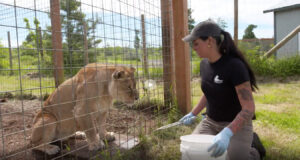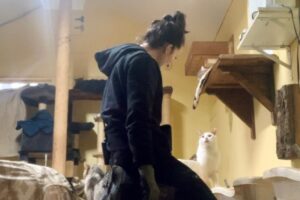What Does it Take to be a Keeper?
The Keeper Journal
Believe it or not, but many of the keepers here at WildCat Ridge Sanctuary did not start out their professional careers right off the bat as animal caretakers. While many of us grew up loving animals, and at some point or other, when asked "What do you want to be when you grow up?" responded with "A veterinarian," we actually ended up spending time working completely different jobs, like an EMT, an elementary school teacher and even a coffee barista.
And yet, our passions obviously got the better of us and, after a few years, changed trajectory completely. But you can ask any of us if it was worth it and likely hear a similar response: "This is my dream job."

But before we get all sentimental and I go off on a huge tangent about pursuing your passions, I think it's important to share some concrete information about what it takes to be a zoo keeper. How do you become one? Where do you start?
Educational requirements
Typically most animal care positions require a college degree or certification in a field like Zoology, Biology, Ecology or some other degree focused on animal management and husbandry. Some community colleges offer two-year zoo keeping degrees, while online certification programs, like the Animal Behavior Institute, offer certifications in numerous specializations, including Zoo & Aquarium Science.
If you're mid-career change and don't have time for another four-year degree program, don't panic. Shorter certification programs, as well as hands-on experience offer valuable skills that many keeping jobs look for.
How do I get hands-on animal experience?

In addition to educational know-how, many positions require animal handling/care experience. There are a number of ways in which you can gain this, such as volunteering at your local humane society, zoo or aquarium, or finding a reputable internship program.
Allow us to note the importance of finding a properly accredited zoo or aquarium at which to volunteer or intern. Looking for AZA accreditation or American Sanctuary Association accreditation will keep you from accidentally winding up at a potentially dangerous or disreputable roadside zoo or attraction. (Plus, accredited institutions just look better on a resume.)
Looking for an internship?
All of us exotic cat keepers here at WCR started out as interns, and we highly recommend interning as a fantastic way to get experience as an animal keeper. While most intern positions, be they at a zoo or sanctuary, are unpaid, the experience and knowledge you gain is crucial to your continuation in the animal field.

We are pleased to have the ability to offer a three month internship program here at WildCat Ridge where you will learn everything from how to prepare Scout and Atticus's daily diet to how to lay concrete. It's a mix of animal husbandry, the occasional landscaping task, keeping the Sanctuary property up-to-date, routine daily tasks and occasionally assisting the keepers with unexpected emergencies.
We find our internship program to be unique in that you get to work through protected contact with exotic big cats, you get to design and implement an intern project, like new animal enrichment, and you get the experience of shadowing and learning from the keepers.
If an internship program at an exotic cat sanctuary is the experience you're seeking, fill out an application today.
We look forward to hearing from you!





